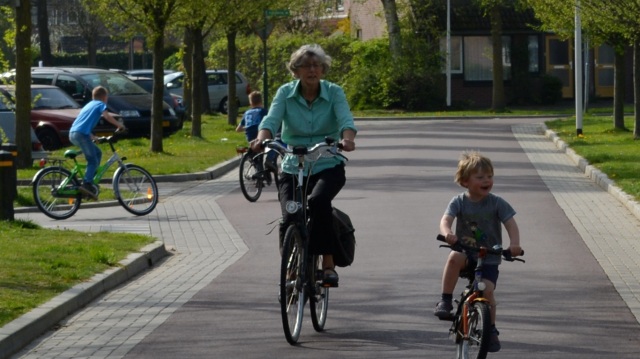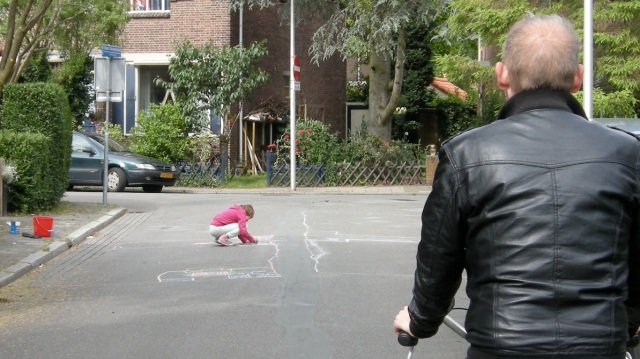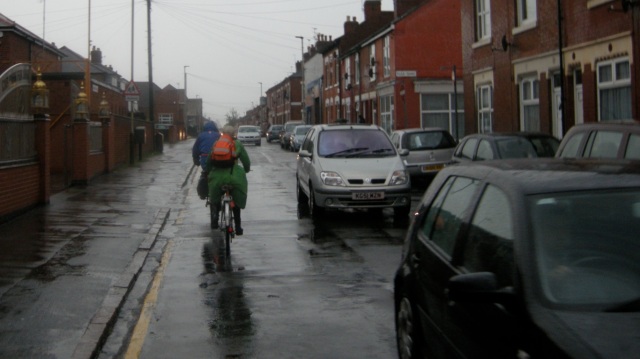So Nigel Farage gave a speech at the White Cliffs of Dover yesterday, in which he suggested that children are not playing football in the street any more because of ‘discomfort’ and ‘unease’ due to high levels of immigration.
I want to live in a community where our kids play football in the streets of an evening and live in a society that is at ease with itself. And I sense over the last decade or more we are not at ease.
If we went to virtually every town up eastern England and spoke to people about how they felt their town or city had changed for the last 10 to 15 years, there is a deep level of discomfort. Because if you have immigration at these sort of levels, integration doesn’t happen.
Further clarification of Farage’s and UKIP’s opinion on this topic was provided by the party’s economic spokesman (and candidate for Cambridge in the 2015 election) Patrick O’Flynn, as reported by the Press Association’s political correspondent –
Even at face value, this smells like total codswallop. If kids want to play football, they really won’t care what country the other kids’ parents might have come from. They just want to kick a ball around – the culture, nationality or language of other children they might want to play with is completely irrelevant.
Now it’s possible parents won’t let their children out on the streets because they have fears about safety due to ‘immigration’, but it’s pretty miserable politics to play up to these fears, and indeed to give them some legitimacy by presenting them as a genuine reason why children are absent from our streets.
If there’s a genuine problem with community cohesion, that can surely only be helped by letting children in the neighbourhood – from all backgrounds – play with each other, on the streets. The answer certainly isn’t to pretend that stopping further immigration into Britain can solve these kinds of problems, where they might exist.
Of course, the real reason why children don’t play on our streets is actual danger in the form of motor traffic. Where streets are closed (even on a temporary basis) to motor traffic, children from diverse backgrounds will happily play with one another – for instance, in one of Britain’s most ethnically diverse areas, Hackney.
And in the Netherlands, where residential streets are usually categorised as ‘access roads’ – not useful routes for motor traffic, and consequently with very low motor traffic levels – spontaneous street play by children is extremely common.
These are safe environments, where the only motor vehicles present will be those accessing properties on the street – residents, visitors, or delivery drivers. That’s it. There’s no real need to speed, as these aren’t through routes, but in any case, most of these locations will have traffic calming in the form of speed tables and tight geometry. The language of the street tells you that it is a residential area, and that, coupled with the low traffic levels, means that they are safe areas for children to play. That’s why parents let them play there – nothing to do with ‘immigration’.
Most residential streets in Britain, by contrast, will often function as through routes – convenient options for people who want to drive the shortest route, or who wish to avoid congestion on parallel main roads.
That’s why children don’t play on them.
If UKIP genuinely want to see children playing on the streets, they need to adopt Sustainable Safety as a policy.









What utter bullcrap! Typical UKIP pandering to the immigration agenda, IMHO the worst thing mass-immigration has brought about is that shameful political party!
I live on a cul-de-sac which cannot operate as a through route, doesn’t stop residents using it as a race track and despite is only being about 1/2 mile from entrance to end I regularly get overtaken down the length if I’m cycling home at the same time someone drives in and quite often they don’t even live at the far end! I should ask them quite how they would feel explaining to kids why daddy needs to go to hospital that evening instead of coming home to them as they couldn’t wait a few extra seconds to get to their front doors.
As for kid playing out there are regularly a small group of kids playing football outside from a wide range of ethnic groups, the main reason we don’t let our kids play is because if their behaviour, which recently included pelting our front door and vehicle parked in front of it with rocks, rather then where they may have come from, when we first moved to the area they’d quite happily get along – one amazing things with children is they don’t “see” skin colour as a barrier or make don’t judgements based on it.
Every cycling issue in the UK stems from the over-reliance on private cars, which stems from one thing in Britain: high house prices and an ingrained need to own the best one. We have continually opted to move further away from our families and place of work just to “get on the ladder” and so are forced to use the car or get to work via a very costly other person’s armpit.
We also now have both parents working, in order to afford the new jumbo mortgage, which has led to even more cars on the road and pressure to drive the kids to school. We have people blocking much needed transport schemes (for all road users, not just pedestrians and cyclists), in the fear that their house price might drop because of it. We have a totally uptight way of life through fear of not being able to pay the mortgage, which is why so many opt to take shortcuts through residential streets just to shave a couple of minutes off their dreary days.
In some ways I can sympathise, because yes in a few indirect ways immigration has negatively affected playing in the street by contributing to this increased reliance on private cars (e.g. population growth putting a strain on infrastructure). But the thing mostly holding cycling back is that old adage “an Englishman’s home is his castle”.
Not to mention a reliance on the state to provide, but with the added threat of legal action against anything non-standard.
I don’t have the stats but I’d be interested to know the commute in miles for England vs the Netherlands.
Distances just seem longer in the UK. It’s to do with there being a lack of good choices. Bad design of the infrastructure results in streets not working for people and main roads not working all that well for drivers either.
It’s relatively easy to travel longer distances in the Netherlands by any means because of there being less congestion on roads. By bicycle it’s especially easy because it’s hassle free.
As it happens, Dutch commutes are on average the longest in Europe.
Good piece, Mark !
“Every cycling issue in the UK stems from the over-reliance on private cars, which stems from one thing in Britain: high house prices and an ingrained need to own the best one. We have continually opted to move further away from our families and place of work just to “get on the ladder” and so are forced to use the car or get to work via a very costly other person’s armpit.”
While growing commuting distances are probably a factor in car use, I don’t think your correlation is correct. The highest levels of cycling are seen in some of the most expensive cities: Cambridge, Oxford, London, Bristol etc. The highest levels of rural commuter cycling are seen in South cambs, and that’s people who can’t afford to live in Cambridge commuting longer distances by bike. Pathetically small levels compared to other places, but high for Britain.
The popularity and prosperity of these cities, the reason why house prices have increased so much, also means that people commuting to them has increased. So traffic is awful, so the most reliable way to travel is by bike, if you can stand the conditions.
No-one is going to do Ipswich or Norwich to Cambridge by bike regularly (I do have colleagues who live in these places!), but they will do 6, 8,10 miles from the nearby villages. In fact as a lot of the major employment is on the city edges, outlying villages can be only 1-3 miles from work.
What a miserable thing to do, blame foreign kids for traffic violence. Parent’s don’t let kids out because of traffic, no other reason. I’ve never heard anyone complain about what nationality a kid is. Kids don’t need a common language and I as an EU immigrant in the Netherlands, with two kids learning Dutch, I should know.
I moved here precisely because the streets are safer and I love living in a place that feels like the world lives here rather than seeing the same old same old.
That man, Farage, is an evil fascist who would be lining immigrants up against a wall if he could get away with it. I hope the UK see’s sense before the election.
So true! I grew up in a traditional Dutch woonerf neighbourhood built in the late ’70 and I still have fond memories of the football games and other playing we did there. Only every 10-15 minutes or so, we’d have to pause our game for a car passing through. (Not only that, also the fact that as 7-10 year olds, we had an area of about 1 sq. km to explore without having to cross any distributor roads did contribute to the fun.)
On the other hand, I’ve rarely seen such places in the UK and even on relatively quiet residential streets, both sides of the street are often filled with parked cars, leaving little space to play.
A small thing, but perhaps significant. Not only do the Dutch design residential areas so that they are for people (and by extension, for children to play) but I’ve also never seen a “no ball games” sign in the Netherlands.
Perhaps UKIP should campaign against “no ball games” ?
A frequent sign on new developments in Cambridge. Winds me up every time I see it.
Developers should be penalised if such signs are used. Just as planners should be punished if unanticipated desire lines appear as tracks across grass or through vegetation.
The woonerf (assuming low actual speed and low volumes, even less than normal access roads) sign, the kind that creates the walking pace, 15 km/h, regulation and that the entire street is open to walk on even if there is a sidewalk, and to expect people living on it, has the playing child actually bigger than the icon for cars. Gives you an idea about who should be the kings and queens of the street. The street also looks like a people’s place, with brick paving, trees, and other things that people like to interact with. Makes it look like a place, rather than a thoroughfare.
It’s encouragement of these multiple uses of streets – from kids’ games through old people’s chats to street trading and so on – which is the best reason to discourage the overuse of and reliance on cars. As Jeldering above points out, it’s not just traffic, parked cars also inhibit the non-traffic use of streets. This is also, IMO, far more likely to gain public and authority support than “cycle paths”, because everyone can see some benefit from it (at least in their own street).
“If kids want to play football, they really won’t care what country the other kids’ parents might have come from.” – true. My own children barely seem to notice nationality or skin colour or ‘ethnicity’, or only to the same level as they notice what colour someone’s hair or eyes are. I hope they stay that way.
“If UKIP genuinely want to see children playing on the streets, they need to adopt Sustainable Safety as a policy.” – but would you care to wager on that actually happening?
From what I have heard UKIP’s roads policy is standard saloon bar motorist supremacy.
“Cyclists: don’t vote for an anti-cycling party
On the eve of the European and local elections, Chris Harvey looks at Ukip’s recent record on cycle policy and despairs ”
http://www.telegraph.co.uk/men/active/recreational-cycling/10846025/Cyclists-dont-vote-for-an-anti-cycling-party.html
Dare I paraphrase the article: “Children don’t play in the streets because there are too many English people living here” 😉
The actual problem with the UK is that the #nastybritain contingent, a minority, has such a stranglehold on power, that the whole economy and infrastructure is built for their benefit. And the rest is happy to play along, as long as there is cheap beer. The lack of ambition for a better, fairer society is quite shocking.
A Swedish expat in London, a woman CEO in her 60s, was telling me, “Some of the things you see in the UK, the inequality, the exploitation of the weak, the penny-pinching for vital infrastructure would be totally unacceptable in Sweden.”
Equally shocking is the general trust in institutions that have shown to be extremely corrupt and inadequate, such as the Police.
I wonder how the average UKIP voter would react if they were unable to drive at speed through town streets on account of their being full of children playing in them?
I can already hear Farage blaming it on the high birth-rate of immgrants.
No one will be able to claim ignorance of UKIP and its xenophobia, let’s hope people will remember that when casting their vote. I wonder when climate-change will be blamed on those ‘foreigners’, ruining the weather with their foul-smelling farts, after consuming their weird kinds of food. As for the kids: give them an environment where they can hang out and play, and they will.
Maybe Mr Farage is clever enough to know the average UKIP voter won’t bother to unpick his preposterous statements. But maybe he is genuinely stupid, who knows?
And UKIP claims it isn’t racist? Mass cognitive dissonance, then.
I’m not 100% sure of the Netherlands, but in Germany any cobbled street (i.e. many residential areas) are automatically a 15 kph zone. Contrast that with the UK, where many narrow streets (cars often parked both sides) and cobbled mews have a 30 mph (50 kph) “limit” – often exceeded, of course. No damn wonder he kids don’t play in the street.
In The Netherlands, such streets do not automatically have a lower speed limit, but oftentimes a 30kph zone will be in place. In a woonerf (or “winkelgebied”, shopping area, same rules) the speed limit is “stapvoets”, i.e. walking pace, which for practical purposes should be interpreted as max 15 kph.
UKIP nationalists. I worry about populists like Donald Trump and the UKIP. The only thing separating trump from the fascists seems to be the lack of a plan to overthrow the government and specifically to install a dictatorship, but with the idea of rioting if they lose…